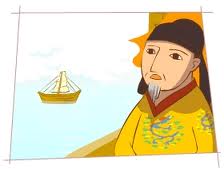瞒天过海
Fool the Emperor to Cross the Sea
原文 Content
备周则意怠;常见则不疑。阴在阳之内,不在阳之对。太阳,太阴。
英文注释:Moving about in the darkness and shadows, occupying isolated places, or hiding behind screens will only attract suspicious attention. To lower an enemy's guard you must act in the open, hiding your true intentions under the guise of common every day activities.
探源 Origin

英文:In 643 AD, Emperor Taizong of Tang baulked from crossing the sea to a campaign against Koguryo. His general Xue Rengui thought of a stratagem to get the emperor across and allay his fear of seasickness: on a clear day, the emperor was invited to meet a wise man. They entered through a dark tunnel into a hall where they feasted. After feasting several days, the Emperor heard the sound of waves and realized that he had been lured onto a ship! General Xue drew aside the curtains to reveal the ocean and confessed that they had already crossed the sea: Upon discovering this, the emperor decided to carry on and later completed the successful campaign.
中文:公元643年,唐太宗大举攻打高句丽却因渡海而畏缩不前。旗下大将薛仁贵想出了一个计谋来克服皇帝的晕船恐惧症。在一个晴朗的日子里,唐太宗被邀请去见一位贤人。他们穿过一漆黑的地道到达一大厅之上并在那里大肆宴席。欢娱数日后,皇帝忽然听见波涛汹涌之声,愕然意识到自己竟被蒙骗上了船。这时薛将军揭开四周的帷幕,告诉大家他们正航行在大海之上,并已顺利地渡过了海。经过这件事情后,唐太宗决定继续战斗并最终取得了胜利。
词汇 Vocabularies
stratagem: 策略,计谋;和strategy不同,stratagem含有诡计,把戏的意味,而strategy则指单纯的战略,策略
suspicious: 猜疑的,多疑的
guise: 外表,伪装
baulk: 同balk,(遇见困难或不愉快的事)畏缩不前,犹豫
allay: 缓和,减轻
lure: 引诱,诱惑
confess: 坦白,承认
carry on: 继续做,坚持;注意如果carry和on中间多了一横,写作carry-on, 就变成一个名词,表示“大惊小怪”、“不得体的行为”或“随身携带的行李”
总结 Summary
“瞒天过海”是一种欺骗的大智慧、大学问,讲究的就是欺骗的隐蔽性和无影无形。隐蔽在那里?隐蔽在天天见的事物中!怎么个无影无形法?因为平常得让他不知不觉。
相关阅读
(来源:沪江英语 编辑:崔旭燕)